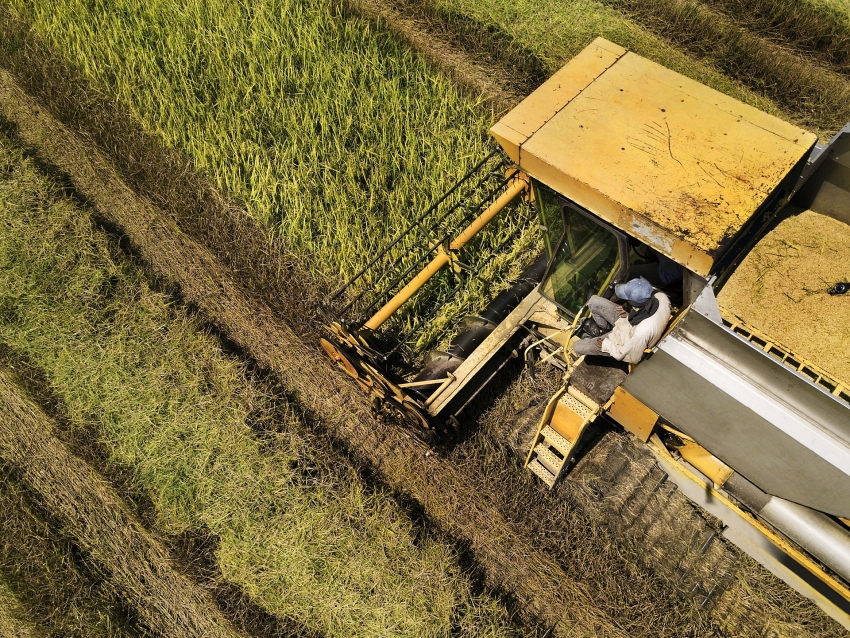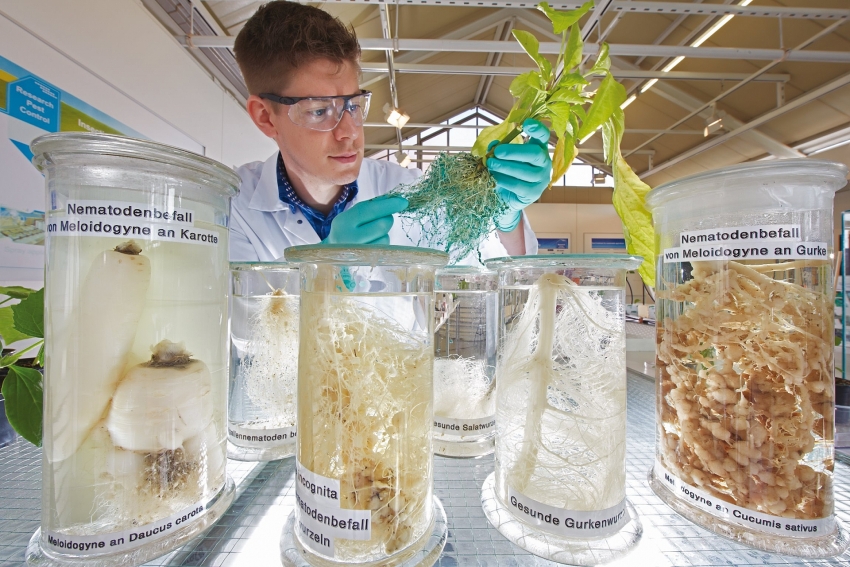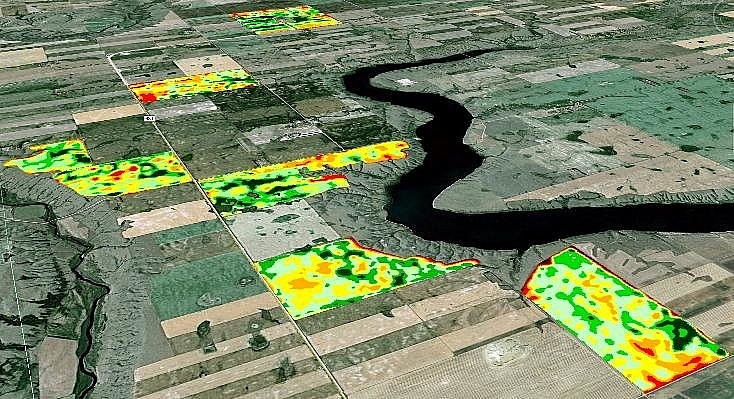Bayer driving sustainable agriculture with industry-leading pipeline
 |
| The contribution Bayer can make to reducing world hunger and poverty is to help farmers to sustainably increase productivity and earn more income |
In 2019, Bayer’s pipeline delivered 55 key project and formulation advancements while providing farmers around the world with more than 450 newly commercialised hybrids and varieties of corn, soybeans, cotton, and vegetables. Bayer’s annual investment of €2.3 billion ($2.5 billion) in crop science research and development powers the most productive pipeline in the industry. With an estimated peak sales value of up to €30 billion ($32.53 billion), Bayer continually converts its R&D investment into innovative products that match the complexities farmers, consumers, and the planet are anticipated to face.
“At Bayer, we are driven to help solve some of the world's toughest challenges. In agriculture, this means helping feed the world without starving our planet. Farmers with operations of all sizes need innovation not only to grow enough nutritious food but also do this in a sustainable manner that respects our planetary boundaries,” said Liam Condon, member of the Bayer Board of Management and president of the Crop Science Division. “Our employees are united around this goal, and our unrivalled pipeline is delivering against it.”
Bayer’s leadership is built on an innovation strategy that balances both incremental and disruptive approaches to R&D. With unmatched expertise across seeds and traits, crop protection, and digital agriculture, Bayer invests in improving high-performing products customers already benefit from today, while also imagining new ways to farm.
 |
| Scientists from Bayer are working on innovative solutions to farmers that help them tackle tough agronomic challenges and become more productive and profitable |
Novel advancements
Bayer announced a new herbicide molecule: the first new post-emergence mode of action for broadacre weed control in 30 years. Multiple MOAs for weed control is important for managing herbicide resistance and enabling practices that help to sequester greenhouse gases, like no-till farming. Discovering new herbicide MOAs has been a challenge for the industry, but Bayer’s continued investment, leading compound library, and advanced screening capabilities have enabled a breakthrough.
Bayer announced a molecule in Phase 2 of early development which has demonstrated effective control of key resistant grasses in early research. The work demonstrates progress toward Bayer’s long-term commitment to investing approximately €5 billion ($5.4 billion) in additional methods to combat weeds over the next decade. Discovery of this molecule is being complemented by a discovery-phase programme to identify and develop a corresponding biotechnology trait to convey herbicide tolerance and initial approaches are under evaluation.
Bayer’s short stature corn is expected to provide environmental sustainability benefits through a transformational shift in crop management flexibility. Because it is several feet shorter than today’s hybrid field corn, the product concept allows farmers to have better in-season crop access for precision applications of inputs, such as nitrogen, which can be made when the plant needs them the most. Some short stature corn hybrids can also be planted closer together, enabling the production of more corn on the same amount of land and potentially reducing requirements for land and water.
Shorter stature will also help improve standability, including better green snap and stalk lodging tolerance, helping reduce crop loss from challenging environmental conditions such as high winds from extreme weather. Bayer announced that both the breeding and biotechnology approaches to create short stature corn are advancing to Phase 3 and also unveiled the third pathway to short stature corn, a Discovery Phase project that has achieved proof of concept through gene editing.
Making best-in-class better
XtendFlex soybeans, the next generation of weed control for soybeans, is advancing to the launch phase this spring in the US, pending regulatory approvals. This product builds on the foundation of Roundup Ready 2 Xtend soybeans and adds tolerance to another herbicide, glufosinate. Beyond XtendFlex, Bayer advanced both fourth- and fifth-generation soy herbicide-tolerant traits, leading the industry with tolerances to six herbicide classes expected to be launched by 2030.
Converting R&D into tailored, value-added solutions for farmers
There’s no one-size-fits-all when it comes to farming. Every combination of products must be tailored to meet the needs of each customer’s field. Digital tools deepen the understanding of those needs, accelerating Bayer’s ability to help farmers with individualised challenges.
The Climate FieldView digital agriculture platform, now available in more than 20 countries, continues to lead the industry with its comprehensive, connected suite of tools that help farmers make data-driven decisions to increase their productivity.
The Adoption of the platform has quickly accelerated due to the value farmers around the globe find in the technology, and FieldView’s innovation in turning data into actionable insights has led farmers to connect more than 95 million acres globally of their farm data to the platform, making it the leader in data connectivity.
The first offering of its kind, Seed Advisor enables better decision-making with a predictive model that combines the industry’s largest proprietary seed genetics library with regional seed performance data to help predict the best performing hybrids for each of a farmer’s fields. Performance testing from 2017-2019 demonstrated a consistent 6-9 bushel per acre yield advantage in farmer field trials. Planned pre-commercial expansions for 2021 include an additional three states vastly growing the number of US corn acres.
In South America, Advanced Seed Prescriptions are unlocking yield potential using a farmer’s historical field data or field health imagery, combined with Bayer proprietary field-testing results, to provide variable rate corn density planting prescriptions tailored to their unique yield or profitability goals. Recent trials have demonstrated an average yield benefit of 3.2 bushels per acre across Brazil and Argentina.
Bayer’s breeding advantage is the product of sophisticated breeding techniques, data science, and digital analytics platforms in concert with the world’s largest germplasm library. Novel applications of machine learning and AI continue to improve the speed and scale at which we can arrive at the best products to meet each grower’s needs.
Identifying the best possible products earlier in the pipeline enables more extensive field testing in diverse conditions and more valuable product insights collected over the course of product development. This data supports the success of the new hybrids and varieties we deliver to farmers each year. In corn, this has translated to Bayer’s leading position in five of the six key corn geographies worldwide.
 |
| A digital map showing the condition and productivity of farmland |
Bayer views investment in innovation as investment in more sustainable agriculture for the next generation
Bayer innovation focuses on producing more on each acre, reducing the environmental impact of farming, and enabling better-informed decisions through data. The company’s commitment to sustainability also includes making innovation available and applicable to farmers with operations of all sizes, all over the world.
Bayer’s ThryvOn Technology, a trait for lygus and thrips control in cotton, is expected to launch in 2021, pending regulatory approval. ThryvOn Technology is predicted to provide immense value to farmers by supporting healthy plant growth and helping protect yield potential against pests that, until now, could not be managed through a biotech trait. Advancements in insect-protection traits reduce the need for foliar insecticide applications and improve productivity per acre.
Today’s crop protection solutions include safer and more effective chemistries through Bayer’s decades-long commitment to evolving the company’s portfolio – including advanced formulations, stricter safety standards and greater efficacy. An example is iblon technology, a novel new fungicide for cereals. Wheat treated with iblon exceeded market standards by 2.2 per cent higher yields on average, allowing farmers to be more efficient and sustainable at all levels of their business.
“We are converting R&D into solutions for farmers that enhance productivity, create new value, and reduce the use of inputs necessary to produce a crop,” said Bob Reiter, head of R&D for the Crop Science Division. “Thanks to our leading positions across technology platforms, Bayer is best positioned to discover, combine, and tailor solutions – serving unmet needs and imagining new ways to farm – and that’s a win for farmers, consumers, and our planet.”
What the stars mean:
★ Poor ★ ★ Promising ★★★ Good ★★★★ Very good ★★★★★ Exceptional
 Tag:
Tag:
Related Contents
Latest News
More News
- Vietnamese businesses diversify amid global trade shifts (February 03, 2026 | 17:18)
- Consumer finance sector posts sharp profit growth (February 03, 2026 | 13:05)
- Vietnam and US to launch sixth trade negotiation round (January 30, 2026 | 15:19)
- NAB Innovation Centre underscores Vietnam’s appeal for tech investment (January 30, 2026 | 11:16)
- Vietnam moves towards market-based fuel management with E10 rollout (January 30, 2026 | 11:10)
- Vietnam startup funding enters a period of capital reset (January 30, 2026 | 11:06)
- Vietnam strengthens public debt management with World Bank and IMF (January 30, 2026 | 11:00)
- PM inspects APEC 2027 project progress in An Giang province (January 29, 2026 | 09:00)
- Vietnam among the world’s top 15 trading nations (January 28, 2026 | 17:12)
- Vietnam accelerates preparations for arbitration centre linked to new financial hub (January 28, 2026 | 17:09)



























 Mobile Version
Mobile Version